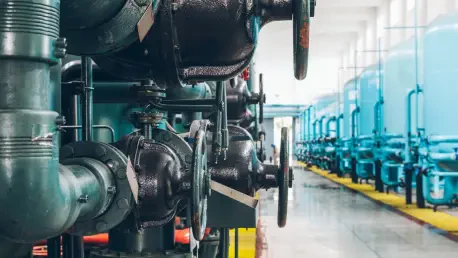Imagine a nation emerging from over a decade of devastating conflict, its infrastructure in ruins, and its people desperate for basic necessities like electricity, a reality that defines Syria today. A groundbreaking energy agreement with Azerbaijan and Turkey promises to deliver a lifeline of natural gas, with an initial export of 1.2 billion cubic meters annually from Azerbaijan’s Shah Deniz field via Turkey, potentially transforming Syria’s recovery efforts. This roundup gathers diverse perspectives from industry leaders, geopolitical analysts, and energy specialists to explore how this pact might fuel rebuilding, reshape regional dynamics, and redefine energy diplomacy in the Middle East.
Diverse Voices on the Energy Lifeline
Industry Perspectives on Energy Security for Syria
Energy sector professionals have expressed cautious optimism about the potential of this gas supply to revive Syria’s crippled power grid. Many highlight that the initial daily flow of 3.4 million cubic meters, with plans to scale up to 2 billion cubic meters annually, could significantly boost electricity generation. Reports suggest this might add up to 750 megawatts of capacity, translating to an extra four hours of daily power in war-torn areas—a critical step for hospitals, schools, and homes.
However, some industry insiders point out the immense challenges ahead due to Syria’s damaged infrastructure. Repairing power plants and transmission lines requires substantial investment, and funding gaps remain a persistent concern. There’s a shared view that while the gas deal offers a foundation, its success hinges on coordinated international support to rebuild the physical systems needed to deliver energy to the population.
A contrasting opinion within the sector emphasizes the symbolic importance of this agreement beyond mere numbers. Restoring power is seen as a tangible sign of progress, potentially boosting public morale and trust in the new government. Yet, there’s a warning that without transparent management, the benefits might not reach those most in need, risking further frustration among citizens.
Geopolitical Analysts on Turkey’s Strategic Maneuvering
Analysts focusing on regional politics underscore Turkey’s pivotal role as both a transit hub and a political ally in this arrangement. Many note that Turkey’s facilitation of the gas corridor, alongside its support for Syria’s new leadership, positions it as a key power broker in the region. This move is often interpreted as part of a broader strategy to expand influence in post-conflict reconstruction.
Some observers, however, caution that Turkey’s involvement carries risks due to lingering tensions with other regional players. Political friction or logistical hiccups could disrupt the flow of gas, undermining the deal’s stability. There’s a split in views on whether Turkey can balance its ambitions with the practical challenges of maintaining neutrality among competing interests in the Middle East.
Another angle from geopolitical circles highlights the diplomatic tightrope Turkey must walk. While the agreement strengthens ties with Azerbaijan and Syria, it also draws scrutiny from other nations wary of Turkey’s growing clout. Analysts suggest that Turkey’s success in this endeavor could set a precedent for how energy transit states wield power in conflict resolution.
Energy Market Experts on Azerbaijan’s Expanding Role
Specialists in global energy markets are keenly watching Azerbaijan’s strategic push to diversify its export destinations beyond traditional Western buyers. The deal with Syria is frequently cited as evidence of Azerbaijan’s ambition to tap into Eastern and Southern corridors, enhancing its stature as a significant player in the industry. This shift is seen as a calculated move to secure long-term economic stability.
Yet, there’s a note of concern among some market watchers about the sustainability of relying heavily on fields like Shah Deniz for such expansions. Questions arise about whether over-dependence on specific resources might expose Azerbaijan to risks if production or demand fluctuates. Differing opinions stress the need for investment in alternative energy sources to safeguard against potential vulnerabilities.
A further perspective focuses on the competitive edge this deal provides Azerbaijan in a crowded market. By forging ties with a recovering nation like Syria, Azerbaijan not only secures a new customer but also builds goodwill that could open doors to other partnerships. Some experts argue this positions Azerbaijan uniquely as both a commercial and humanitarian actor in energy politics.
Regional Stability Advocates on Energy Diplomacy
Voices advocating for peace and stability in the Middle East view this gas agreement as a rare blend of economic and humanitarian goals. Many believe that energy partnerships can serve as a tool for post-conflict stabilization, fostering trust among nations with historically strained relations. The collaboration between Azerbaijan, Turkey, and Syria is often praised as a model that prioritizes mutual benefit over rivalry.
On the flip side, some stability-focused commentators warn that energy deals alone cannot address deeper political fractures. They argue that without parallel efforts to resolve underlying conflicts, such initiatives risk becoming mere stopgaps rather than lasting solutions. There’s a call for integrating energy diplomacy with broader peacebuilding frameworks to maximize impact.
An additional viewpoint emphasizes the potential ripple effects across the region. If successful, this pact could inspire similar resource-sharing agreements elsewhere, redefining how energy is leveraged for recovery. Proponents of this idea suggest that the Middle East, long plagued by resource disputes, might find a new path toward cooperation through such innovative collaborations.
Reflecting on a Milestone in Energy Collaboration
Looking back, this roundup of insights reveals a multifaceted picture of the Azerbaijan-Turkey-Syria gas deal, with opinions ranging from hopeful to cautiously pragmatic. Industry experts celebrated the potential for energy security in Syria, while geopolitical analysts unpacked Turkey’s complex role as a mediator. Energy market specialists highlighted Azerbaijan’s bold market expansion, and stability advocates saw a blueprint for peace through shared resources. For those eager to delve deeper, exploring reports on regional energy partnerships or studies on post-conflict reconstruction offers valuable next steps. More importantly, stakeholders are encouraged to prioritize joint investments in Syria’s grid repairs and establish robust monitoring systems to ensure the deal’s benefits reach the ground level, paving the way for sustainable recovery and stronger regional ties.









